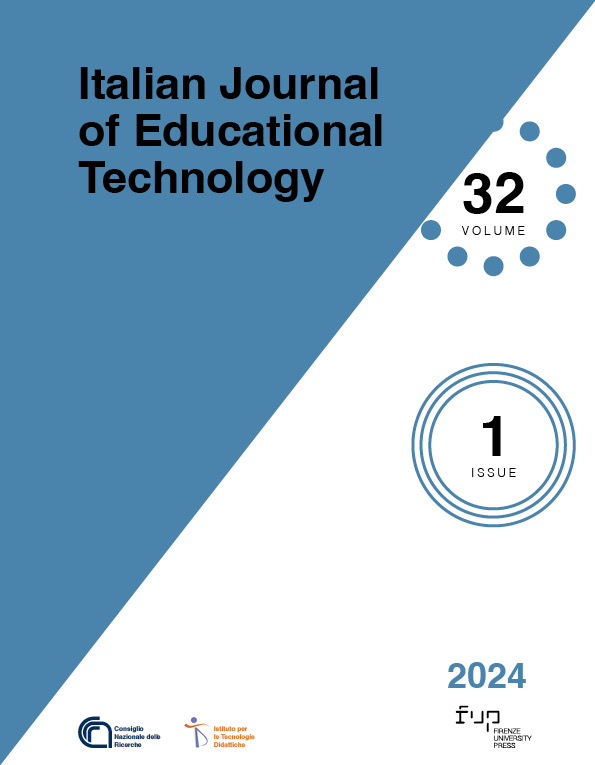Editorial. Artificial Intelligence and the paradigm shift of teachers’ role
Contenuto principale dell'articolo
Abstract
Technological ‘evolution’ has always influenced the world of education by providing new opportunities and challenges for teachers, school leaders, students, and families. Among the various technologies today, artificial intelligence (AI) is the one that attracts most of the interest. In fact, for the last two decades, the intertwining of AI and education has been the subject of intense study, so much so that research in this field has already contributed to providing the first evidence, in particular by demonstrating the ability of AI-based systems to meet the individual needs of students (Brusilovsky, 1996; Azevedo, 2002; Nye, 2015; Hemmler & Ifenthaler, 2022; Azevedo et al., 2022).
However, the ‘new renaissance’ that AI is experiencing, generated by innovations coming mainly from research in deep learning and generative AI, seems to outline scenarios that go far beyond the effect that new technologies typically have in the educational sector (Gentile et al., 2023a). In fact, recent advances in AI seem to have the power to reshape traditional educational paradigms (Ifenthaler et al., 2024), so much so that there is a discussion on how AI may influence the academic sector and future educational policies.
In this context, which forms a paradigm shift (Kuhn, 1970), teachers are certainly one of the key players involved and called upon to be actively involved in the change processes. After all, teachers have always been called upon to update their teaching practices by seeking to integrate new technologies rather than reject them. However, even in relation to the teacher's role, the changes introduced by AI signal a radical change.
The special issue, “Artificial Intelligence and the paradigm shift of teachers’ role”, aims to assess this dimension that recent AI advancements in education have produced. Through a meticulous peer-review process, we selected five papers that contribute different points of view concerning the dimensions of change in the teacher's role (Gentile et al., 2023b).
Dettagli dell'articolo
Sezione

Questo volume è pubblicato con la licenza Creative Commons Attribuzione 4.0 Internazionale.
Gli autori che pubblicano su questa rivista accettano le seguenti condizioni:
- Gli autori mantengono i diritti sulla loro opera e cedono alla rivista il diritto di prima pubblicazione dell'opera, contemporaneamente licenziata sotto una Licenza Creative Commons CC BY 4.0 Attribution 4.0 International License.
- Gli autori possono aderire ad altri accordi di licenza non esclusiva per la distribuzione della versione dell'opera pubblicata (es. depositarla in un archivio istituzionale o pubblicarla in una monografia), a patto di indicare che la prima pubblicazione è avvenuta su questa rivista.
- Gli autori possono diffondere la loro opera online (es. in repository istituzionali o nel loro sito web) prima e durante il processo di submission, poiché può portare a scambi produttivi e aumentare le citazioni dell'opera pubblicata (Vedi The effect of Open Access).
Riferimenti bibliografici
Azevedo, R., Bouchet, F., Duffy, M., Harley, J., Taub, M., Trevors, G., Cloude, E., Dever, D., Wiedbusch, M., Wortha, F., & Cerezo, R. (2022). Lessons learned and future directions of MetaTutor: Leveraging multichannel data to scaffold self-regulated learning with an intelligent tutoring system. Frontiers in Psychology, 13. https://doi.org/10.3389/fpsyg.2022.813632
Brusilovsky, P. (1996). Methods and techniques of adaptive hypermedia. User Modeling and User-Adapted Interaction, 6(2–3), 87–129. https://doi.org/10.1007/bf00143964
Gentile, M., Città, G., Marfisi-Schottman, I., Dignum, F., & Allegra, M. (2023a). Editorial: Artificial intelligence for education. Frontiers in Education, 8. https://doi.org/10.3389/feduc.2023.1276546
Gentile, M., Città, G., Perna, S., & Allegra, M. (2023b). Do we still need teachers? Navigating the paradigm shift of the teacher’s role in the AI era. Frontiers in Education, 8. https://doi.org/10.3389/feduc.2023.1161777
Ifenthaler, D., Majumdar, R., Gorissen, P., Judge, M., Mishra, S., Raffaghelli, J., & Shimada, A. (2024). Artificial intelligence in education: implications for policymakers, researchers, and practitioners. Technology, Knowledge and Learning. https://doi.org/10.1007/s10758-024-09747-0
Hemmler, Y., & Ifenthaler, D. (2022). Four perspectives on personalized and adaptive learning environments for workplace learning. In D. Ifenthaler & S. Seufert (Eds.), Artificial intelligence education in the context of work (pp. 27–39). Springer. https://doi.org/10.1007/978-3-031-14489-9_2
Kuhn, Thomas (1970). The structure of scientific revolutions (2nd, enlarged ed.). University of Chicago Press.
Nye, B. D. (2014). Intelligent Tutoring Systems By and for the Developing World: A review of trends and approaches for educational technology in a global context. International Journal of Artificial Intelligence in Education, 25(2), 177–203. https://doi.org/10.1007/s40593-014-0028-6

